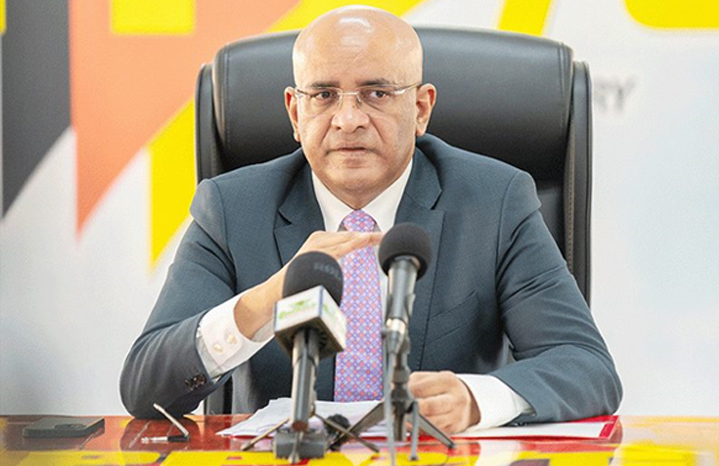Respect between nations is paramount in the intricate web of international trade. However, recent events, such as Trinidad and Tobago’s rejection of Guyanese milk and bottled water, have underscored a troubling pattern of disrespect by the Trinidad and Tobago authorities towards Guyana and its people, particularly in trade and business relations.
For far too long, Guyanese citizens have borne the brunt of mistreatment at the hands of Trinidadians. Fuelled by economic disparity, some Trinidadians have used their wealth as a tool for exploitation, a practice that is not only devoid of decency but also a clear violation of the principles of fair trade and mutual respect. The resilience of Guyanese individuals in the face of such egregious treatment is not just admirable, but it also demands our empathy and support. Imagine the potential benefits of a fair and mutually beneficial trade relationship between Guyana and Trinidad and Tobago.
The trade gap between Guyana and Trinidad and Tobago is increasing in favour of the Trinidadians. Trinidad and Tobago exports over $1 billion USD of goods and services to Guyana, whereas Guyana only exports over $300 million USD to Trinidad and Tobago. This imbalance not only hampers Guyana’s economic growth but also perpetuates the cycle of exploitation and disrespect in the trade relationship.
Let’s not forget that Guyana is no longer a nation to be overlooked. It has emerged as the economic powerhouse of the Caricom region, radiating resilience and potential. Its new oil and gas reserves, currently at over (11 billion barrels of the best quality oil and over 17 trillion cubic feet (tcf) reserve of gas), are a testament to its promising future. These reserves, comparable to those of Middle Eastern countries, are poised to revolutionize Guyana’s economic landscape.
Trinidad and Tobago isnot in the same economic league as Guyana. Trinidadians are scrambling and resorting to any means possible to do business in Guyana. In fact, Guyana is a magnet for foreign business entities worldwide, including Trinidadians, who attract planes full of them every week, a clear testament to its burgeoning economic influence. In contrast, Trinidad and Tobago are struggling to come to terms with Guyana’s triumphant economic developments.
The most recent episode involving Trinidad and Tobago’s rejection of Guyanese products, notably packaged milk and bottled water, serves as a stark reminder of the challenges faced by Guyana in fostering equitable trade relationships. Guyana faces unwarranted barriers and discriminatory practices despite participating actively in regional trade agreements such as the Caricom Single Market and Economy (CSME).

In response to these unjust actions, Guyana’s Vice President, Dr. Bharrat Jagdeo, has rightfully signalled a stance of reciprocity, emphasizing that if certain restrictions are imposed on Guyanese goods, similar measures will be applied to imports from Trinidad and Tobago. This assertion is not borne out of retaliation but instead seeks to uphold the principle of parity in trade relations.A clear and unwavering commitment to fair and respectful trade practices should guide all our interactions in the Caricom region.
Mr. Komal Samaroo, Chairman of Demerara Distillers Limited (DDL), has sounded the alarm on the hurdles facing Guyana’s export sector in Trinidad and Tobago. On Tuesday,Mr Samaroo spotlighted the challenges encountered in exporting packaged milk and bottled sparkling water to Trinidad and Tobago, shedding light on a troubling trend of unfair trade practices.
Mr. Samaroo’s revelation paints a concerning picture of Guyanese products’ treatment in Trinidad and Tobago. With two containers of milk outright rejected and two containers of bottled water subjected to excessive scrutiny, it’s evident that barriers to entry exist, hindering the smooth flow of goods between nations.
Central to this issue is the need for mutual respect and adherence to established trade protocols. As a burgeoning oil and gas production hub, Guyana holds immense economic growth and prosperity potential. When realized in an environment where all parties honour their commitments and treat each other with dignity and fairness, this potential can inspire hope for a brighter future.
Furthermore, the plight of the Guyanese citizens who endured constant mistreatment at Trinidadian airports serves as a poignant reminder of the human cost of these unnecessary disputes. No individual should be subjected to discrimination or humiliation based on their nationality.
As Guyana continues to assert its position on the global stage, its trading partners must recognize and respect its sovereignty and economic aspirations. The path to sustainable development lies not in exploitation or coercion but collaboration and mutual benefit.
The recent challenges faced by Guyana in its trade relations underscore the need for a renewed commitment to mutual respect and fair treatment. By upholding the principles of equity and dignity, nations can forge a path towards a more prosperous and harmonious future for all. This call for mutual respect and fair treatment is a lasting impression that should guide our future actions in international trade.
Guyana’s business community must be grateful to Mr. Komal Samaroo for exposing the hurdles faced by Guyanese companies doing business with Trinidad and Tobago.
Dr Bharrat Jagdeo mentioned the Trinidadian authorities’ restrictions on Guyanese products at his press conference. Trinidad and Tobago must tread carefully with Dr. Jagdeo, who does not suffer fools gladly.





